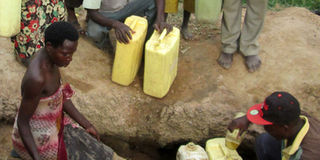Local govts demand 28% increase in Budget share

What you need to know:
Local governments indicate that an increase in their budget share will address gaps in staffing, implementation of projects and widen the local revenue base.
Local governments have called for increase of their funding in the national Budget from 9.5 per cent to 38 per cent in order to address underperformance in service delivery.
The appeal was made by Mr Joseph Lomonyang, the president of Uganda Local Governments Association (ULGA), while presenting the a position paper of the association during the National Budget Conference for 2021/2022 Financial Year at the Office of the Prime Minister (OPM) yesterday.
“Local governments are struggling with inadequate funding from the provision of 9.5 per cent allocation from the national budget for 2020/2021 Financial Year. There is a continuing trend of decline in allocations and we are indeed bothered that the national budget adjustments carry grave implications on local governments,” he said.
“Not only can’t we deliver sufficient and quality local services to our people, but the Covid-19 pandemic has also had its toll on the local economies hence affecting local revenue set targets,” he added.
The 2019/2020 Sector Performance Report for local governments released on Monday shows that the sector has persistently failed to achieve up to 32 per cent of its performance and service delivery requirements.
Mr Lomonyang asked the central government to “increase national budget share for local governments to at least 38 per cent” to address the gaps in staffing, implementation of projects and widening local revenue base through increasing agricultural productivity and other local investments.
However, Mr Kirunda Kivejinja, the Second Deputy Prime Minister, said local governments should focus on widening local revenue collections instead of demanding more funds from the central government.
“ULGA wants the cake [national budget] to be shared equally but we must first bake the cake and then talk about sharing it equally. So local governments, don’t just go on demanding your share,” Mr Kivejinja told the heads of local governments.
Mr Julius Mukunda, the executive director of Civil Society Budget Advocacy Group (CSBAG), asked the government to institute measures to punish underperformance and reward good performance in the public sector.
Duplication of mandates
Lt Gen Charles Angina, the deputy coordinator of Operation Wealth Creation (OWC), said government should address duplication of mandates.
“For example, the farm income enhancement and forest conservation at the Ministry of Water and Environment is a duplication of activities done by Agriculture Ministry, National Agriculture Advisory Services (NAADs) and OWC,” Lt Gen Angina said.
Mr Matia Kasaija, the Finance minister, said: “There is inequality in development among regions and districts. I have been moving across the country and some of the regions are very bad. Some people cannot even afford a meal...,” he said.
Prof Pamela K. Mbabazi, the chairperson of National Planning Authority (NPA), however, said the government has decided to shift away from a Sector-based Approach to Programme Approach such that they can address underperformance in service delivery, duplication of mandates and imbalances in regional development.
Prof Mbabazi said the Programme-based Approach makes it easy to track performances and inconsistencies such as corruption.
According to the document presented by the Finance minister, there are 18 programmes that the government has come up with.
Mr Kasaija said the proposed budgetary allocation to the listed programmes is Shs30.8 trillion out of 40.2 trillion for 2021/2022 Financial Year.
Proposed budget by programme (Shs30.8 trillion)
.Governance and security Shs6.8 trillion.
.Human capital development Shs6 trillion
. Interest payment Shs4.8 trillion
.Regional balanced development Shs1.8 trillion
. Climate change and natural resources management Shs1.4 trillion
.Agro-industrialisation Shs1.3t
.Sustainable energy development Shs803b
.Public sector transformation Shs577b
.Development plan implementation Shs584b
.Technology transfer and development Shs261b
.Private sector development Shs223b
.Sustainable urban development Shs209b
.Community mobilisation and mind-set change Shs174b
. Tourism development Shs197b
.Digital transformation Shs120b
.Sustainable development of petroleum resources Shs115b
.Manufacturing Shs89b
.Mineral development Shs92b (0.3 per cent)
Memo items
External debt repayments Shs1.2 trillion, domestic refinancing Shs7.5 trillion, domestic arrears Shs453b, and appropriation in aid/local revenue Shs215b, bringing the proposed grand total Budget of 2021/2022 to 40.2 trillion




